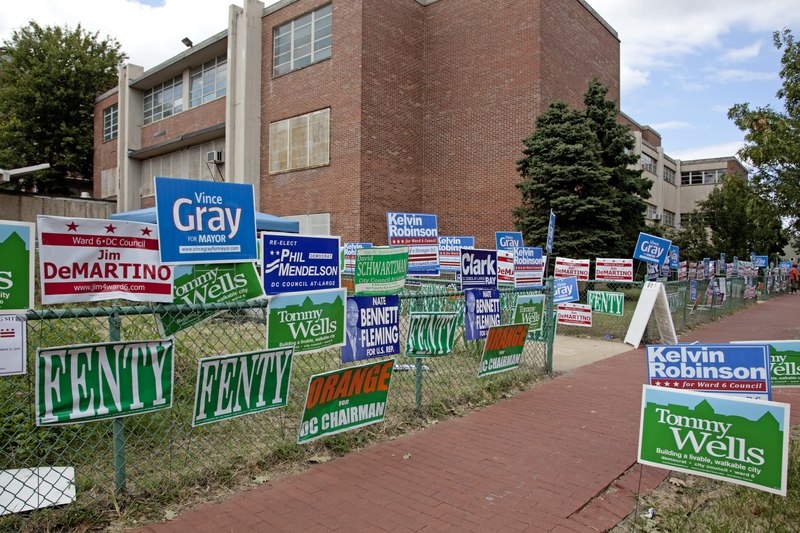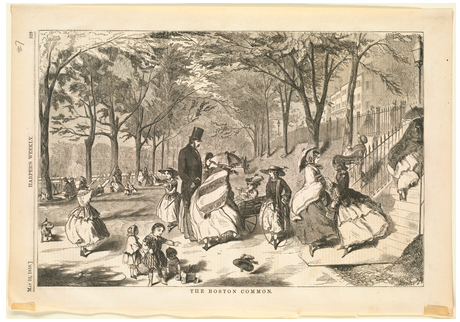Standard 6.8: Leadership Structure of the Massachusetts Government
Explain the leadership structure of the government of the Commonwealth of Massachusetts and the function of each branch. (Massachusetts Curriculum Framework for History and Social Studies) [8.T6.8]
 Photo of the Great Blue Hill in Milton, Massachusetts (2009), by Swampyank, Public Domain
Photo of the Great Blue Hill in Milton, Massachusetts (2009), by Swampyank, Public DomainMassachusetts is an Algonquin Indian word which roughly translates to “large hill place” or “at the great hill.” This refers to the Great Blue Hill in Milton, Massachusetts - an ancient volcano last active over 400 million years ago (History of Massachusetts Blog, December 2, 2015). The names of the state’s 14 counties were borrowed from places in England (Where Did Massachusetts Counties Get Their Names? from MassLive).
The state’s population in July 2019 was estimated at 6.8 million people, 16.5% over age 65 (slightly more than the national average) and 19.8% younger than 18 (somewhat less than the national average). About 16.5% of the state’s residents are foreign-born (higher than the national average). Median household income was $77,378 compared with $60,293 nationwide; 10% of the population were living in poverty, less than the national average of 11.8%. 90.1% of Massachusetts households have a computer; 84.7% have broadband subscriptions (Anderson, 2020).
The state government's legislative, executive, and judicial structure is similar to the three branches of the nation's federal government. Importantly, Massachusetts has had many history-making political milestones which have made its government more representative of all genders and races. Going forward, with millions of people living in a geographically small area, that state's government faces enormous challenges. One of those challenges - how can state government promote greater equity in jobs and careers for women and men - is at the center of how democracy in the 21st century.
1. INVESTIGATE: The Structure of Massachusetts Government
Massachusetts is one of four states that are legally called a “commonwealth” - Kentucky, Virginia, and Pennsylvania are the others. Commonwealths and states all have a structure similar to the federal government with three co-equal branches - executive, legislative and judicial - that in theory serve to check and balance each other.
Executive Branch
The executive branch is made up of the Governor, the governor's cabinet, the state treasurer, the state auditor, the attorney general, the state comptroller, and the state secretary.
Governor
- The governor is the chief executive officer, similar to the president in the federal government. The governor is elected in a state election and serves a four-year term. The current governor of Massachusetts is Charlie Baker (2020).
The Governor's Cabinet
- The governor's cabinet is similar to the president's cabinet. The governor's cabinet is made up of Executive Office for Administration and Finance, the Executive Office of Health and Human Services, the Executive Office of Transportation and Public Works, the Executive Office of Public Safety and Security, the Executive Office of Housing and Economic Development, the Executive Office of Labor and Workforce Development, the Executive Office of Education and the Executive Office of Energy and Environmental Affairs.
The Attorney General
- The attorney general represents all legal proceedings in both state and federal courts. The attorney general also brings actions to enforce environmental and consumer protection statutes.
Treasurer and Receiver General
- The state treasurer manages state funds and investments; the Alcoholic Beverages Control Commission (ABCC) is part of this office.
Auditor
- The state auditor conducts audits and investigations to improve the work of state government.
Legislative Branch
The legislative branch is made up of the State Senate and House of Representatives:
- State Senate: The state Senate is made up of 40 members. State senators are elected for two-year terms.
- House of Representatives: the House is composed of 160 members. Representatives also serve two-year terms.
The blog Beacon Hill Roll Call provided information about salaries and benefits for the 40 individuals who are Massachusetts state senators for the 2023-2024 legislative session (Katzen, March 24, 2023).
- $73,655 base salary (adjusted up or down every two years based on quarterly changes in salaries and wages).
- Extra pay for leadership positions with the Legislature.
- $20,468 or $27,291 for general expenses (including district offices; printing and mailing newsletters).
- Some are eligible to pay reduced or no federal income tax (if they live 50 miles or more the State House in Boston).
- Parking space benefit
- Health insurance; Life insurance; Long-term disability and health care spending account; Dental and Vision insurance.
Judicial Branch
The judicial branch is made up of the Supreme Judicial Court, the Appeals Court, and the Trial Court. The Appeals Court and the Trial Court are appointed by the Governor.
In some states, judges are elected by the voters, but in Massachusetts they are appointed by the Governor with advice and consent of the Governor's Council. Judges have a lifetime appointment with a mandatory retirement age of 70. You can learn more at How a Judge is Selected in Massachusetts.
Other Elected Offices
Massachusetts also has a number of elected political offices at the county level, including County Commissioner, District Attorney, County Treasurer, Register of Deeds, Register of Probate, Check of Courts, and Sheriff.
Often the individuals holding these offices remain largely unknown to many citizens, but their actions have a great impact on local and state policies. For example, a 2022 poll by the American Civil Liberties Union (ACLU) found that only 17% of Massachusetts voters could identify their county sheriff. Sheriffs run county jails and houses of correction, and also have key roles in responding to drug addictions and mental health issues in cities and towns. In response, the ACLU launched a "Know Your Sheriff" social media campaign to raise awareness and encourage voter participation.
 Watch on YouTube
Watch on YouTube
How would you design a social media campaign to inform the public about your local county Sheriff or one of the other county offices? How would you motivate more voters to participate actively in choosing who gets elected to these positions?
Media Literacy Connections: Online Campaigning for Political Office
In Massachusetts, like most states, voters elect people to multiple positions in state government, including: Governor, Lieutenant Governor, Secretary of the Commonwealth (or Secretary of State), Attorney General, Treasurer, Auditor, Governor's Council Member, State Senator, and State Representative. They do not elect judges who are appointed. You can learn more at Who Are My Elected Officials? In some states, people can also elect State Supreme Court Justices.
 Political campaign posters at the Hine Junior High School, 8th St. near intersection with D St., SE, Washington, D.C | Public Domain
Political campaign posters at the Hine Junior High School, 8th St. near intersection with D St., SE, Washington, D.C | Public DomainSocial media has become a powerful tool for candidates running for political offices. One recent study demonstrated that new political candidates (those running for office for the first time) can receive substantial boosts in financial donations and public recognition using Twitter as a campaign marketing tool (Petrova, Sen, & Yildirim, 2020). The advantages of social media for political candidates are clear: Twitter, Facebook, and other social media sites are: 1) free to use and 2) can reach large numbers of potential voters - both essential for successful election campaigns.
Imagine that you have decided to run for a political office in your state's government. Since considerable amounts of time and money are involved in traveling the state and meeting voters face-to-face, you have decided to do most of your campaigning online. How will you do this?
In this activity, you will develop a digital or paper and pencil prototype of an online political campaign for a state political office.
Suggested Learning Activity
- Research how other state governments are organized
Online Resources for the Structure of Massachusetts Government
2. UNCOVER: Milestones and Changemakers in Massachusetts History and Politics
Massachusetts has had many historical firsts, including:
- First public park (Boston Common, 1634)
- First public secondary school (Boston Latin Grammar School, 1635)
- First university (Harvard)
- First public library
- First state constitution
- First church built by free Blacks (African Meeting House)
- First basketball game (Springfield)
- First American subway system (Boston).
 The Boston Common by Winslow Homer, 1858, Boston Public Library, Public Domain
The Boston Common by Winslow Homer, 1858, Boston Public Library, Public DomainMassachusetts state government also has had many important historical firsts and key achievements for women and people of color (see Table 6.8 below).
Why are "firsts" important? When asked in an interview what gave him the energy, inspiration and power to keep pushing back in a hostile political and racial climate, James A. Banks, the first Black professor in the College of Education at the University of Washington said, "what really kept me going was a belief in the possibilities" (University of Washington Magazine, December 2018, para 6). Banks was a pathfinder who, in his words, believed in the importance of "decisive action to move us toward justice" (para. 10).
Importantly, those firsts are still happening in 2021. Rachael Rollins was the first woman of color to serve as a District Attorney in Massachusetts and in July 2021 was nominated by President Joe Biden to serve as the United States Attorney for Massachusetts. According to Neidig (2021), even though "Rollins has served as a federal prosecutor in the past, her appointment is notable given her advocacy on criminal justice reform and, if confirmed, she will become the first Black woman to fill the Massachusetts U.S. attorney role" (para. 3).
View the trailier for the film Legacy of Courage: Black Changemakers in Massachusetts Past, Present and Future.
Table 6.8 Diversity Milestones in Massachusetts History and PoliticsFirst African American Men Elected to the Massachusetts Legislature | Edward Garrison Walker and Charles Lewis Mitchell (1866) |
First African American Woman Elected to the Massachusetts House | Doris Bunte (1973) |
First African American Man Elected to the Massachusetts Senate | Bill Owens (1975) |
First Hispanic Man Elected the Massachusetts Legislature | Nelson Merced (1988) |
First Hispanic Woman Elected the Massachusetts Legislature | Cheryl Coakley-Rivera (1999) |
First LGBT Candidate Elected the Massachusetts Legislature | Elaine Noble (1975) |
Suggested Learning Activities
- Research
- Expand upon Table 6.8 by adding a list of other firsts for Massachusetts government and politics. Here are three more examples to get your started:
- First African American Elected to the United States Senate: Edward Brooke (1966)
- First African American Chief Justice of the Massachusetts Supreme Court: Roderick L. Ireland (2010)
- First African American Woman Elected to the United States House of Representatives: Ayanna Pressley (2018)
- Design a "Firsts" eBook for Your State
- Create a class eBook (on Book Creator or Google Docs) about milestones in your state's history and politics.
- Each student can select a milestone and create a multimodal, interactive (e.g., hyperlinks, embedded media) page or chapter to add to the collaborative class book.
- Analyze Media Coverage of “Firsts”
- How did the media cover the “firsts”?
- How did the media influence what happened?
3. ENGAGE: What Can Government and Businesses Do to Eliminate Gender Gaps in Wages and Jobs?
In 1945, Massachusetts became the first state to pass an Equal Pay Law mandating that women be paid the same as men when doing the same job. That law was updated in 2018 with the Massachusetts Equal Pay Act. Today, most states have laws against wage discrimination based on gender—only Alabama and Mississippi do not have equal pay laws.
 It’s time for equal pay for equal work (Gillibrand, 2020), by Kristen Gillibrand for President, Public Domain
It’s time for equal pay for equal work (Gillibrand, 2020), by Kristen Gillibrand for President, Public DomainStill a gender pay gap exists across most occupations and industries in this country. Women make less money than men, often much less—on average 82 cents for every dollar made by men (The Simple Truth about the Gender Pay Gap). In 2019, 26 of the 30 highest paying jobs were male-dominated; 23 of the 30 lowest paying jobs were female-dominated (Women in Male-Dominated Industries and Occupations: Quick Take, Catalyst, February 5, 2020).
Equal Pay Day is the day in a year that women must work until they earn what men earned the previous year. Equal Pay Day for all women in 2019 was June 10; for Black women it was August 22.
Suggested Learning Activity
- Design a Public Policy Initiative
- What else must be done besides equal pay laws to eliminate gender gaps in wages and jobs?
- Develop a short video or podcast explaining your proposal for action
Online Resources for Equal Pay Laws
Standard 6.8 Conclusion
Massachusetts has a system of government like the other states in the United States. INVESTIGATE outlined the structure of the state’s legislative, executive and judicial branches of government. UNCOVER presented milestones in Massachusetts government, many of which opened the way for wider transformations in politics throughout the nation. ENGAGE asked what steps state government can and should take to eliminate gender gaps in wages and jobs.